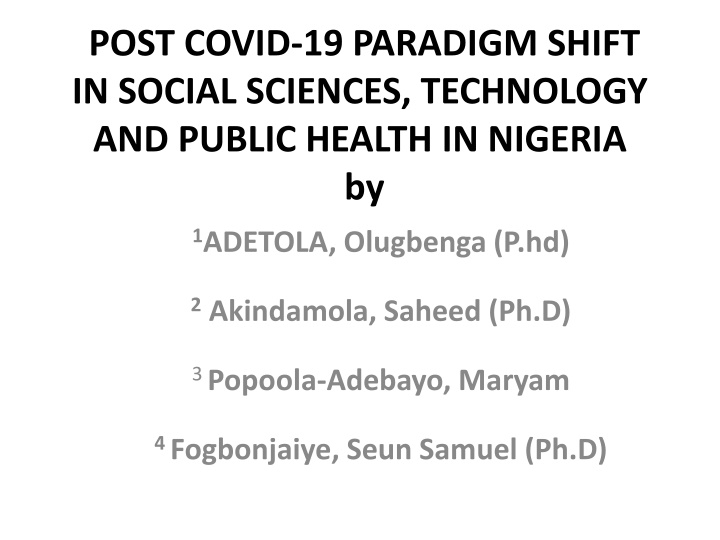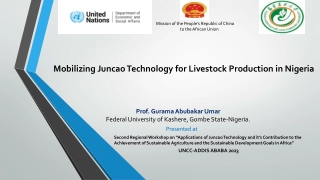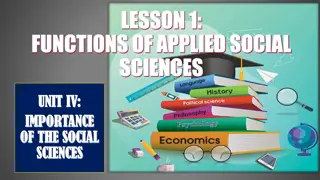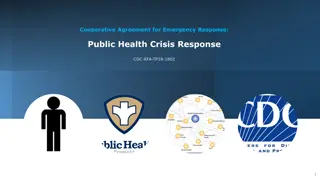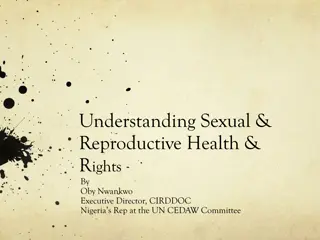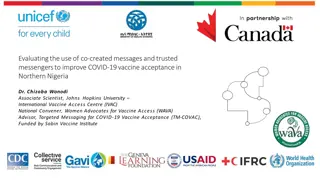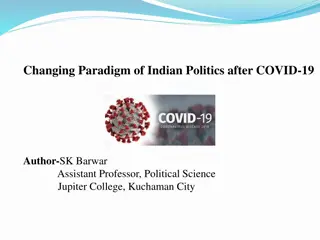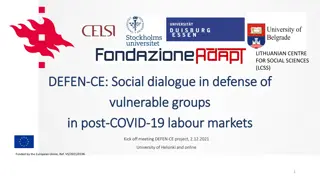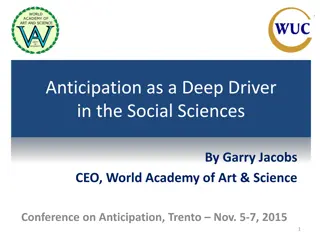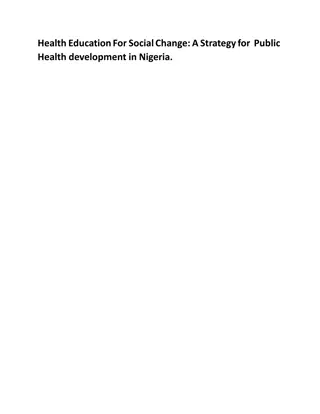Post-COVID-19 Paradigm Shift in Nigeria: Social Sciences, Technology, Public Health
The study explores the impact of the COVID-19 pandemic on social changes, technology usage, and public health in Nigeria, addressing the sudden shifts and challenges faced by organizations and individuals. With a focus on understanding the evolving dynamics post-pandemic, the research aims to provide valuable insights into the changing landscape of the country's social, technological, and healthcare sectors.
Download Presentation

Please find below an Image/Link to download the presentation.
The content on the website is provided AS IS for your information and personal use only. It may not be sold, licensed, or shared on other websites without obtaining consent from the author.If you encounter any issues during the download, it is possible that the publisher has removed the file from their server.
You are allowed to download the files provided on this website for personal or commercial use, subject to the condition that they are used lawfully. All files are the property of their respective owners.
The content on the website is provided AS IS for your information and personal use only. It may not be sold, licensed, or shared on other websites without obtaining consent from the author.
E N D
Presentation Transcript
POST COVID-19 PARADIGM SHIFT IN SOCIAL SCIENCES, TECHNOLOGY AND PUBLIC HEALTH IN NIGERIA by 1ADETOLA, Olugbenga (P.hd) 2Akindamola, Saheed (Ph.D) 3 Popoola-Adebayo, Maryam 4 Fogbonjaiye, Seun Samuel (Ph.D)
OUTLINE Background Literature: Concepts of Covid-19 Pandemic Concepts of Paradigm Shift Theoretical Review: Swan Theory Flu Theory Empirical Review Methodology Conclusion and Recommendations
POST COVID-19 The world is at its most interdependent economically and has never faced this level of comprehensive interruption. In the short-term, organizations have generally engaged in empathic pro-employee responses, and many have radically altered how and where employees work. At face value, both actions seem both reasonable and prudent. Many are adjusting to novel organizational demands of the pandemic while hoping for a swift return to normal. In time, the implications of these demands may not only shift but have a lasting effect on the way organizations and employees function, resulting in a new normal (Loayza & Pennings, 2020).
STATEMENT OF PROBLEM The lockdowns across countries have entailed a rise in the use of information systems and networks, with massive changes in usage patterns and usage behaviour. Employees are adjusting to new "normals - with meetings going completely online, office work shifting to the home, with new emerging patterns of work. The changes have also come suddenly, with barely any time for organizations and people to plan for, prepare and implement new setups and arrangements; they have had to adjust, try, experiment, and find ways that did not exist before.
CONTD The major victims of COVID-19 outbreak are organizations in the developing countries including the government agencies because they do not possess sufficient resources, especially financial and managerial, and are not prepared for such disruptions likely to go longer than expected (Rahman & Matin, 2020). Countries that depend on oil and tourism for foreign exchange and fiscal revenues will especially face reduced fiscal space and heightened external account imbalances, stoking a build-up of public debt.
RESEARCH OBJECTIVES The aim of the study is to investigate the Post Covid-19 Paradigm Shift in Social Sciences, Technology and Public Health in Nigeria. The specific objectives were: To examine the effect of covid-19 spread rate on social changes in Nigeria To ascertain the effect of covid-19 spread rate on changes in technology usage in Nigeria To investigate the effect of covid-19 spread rate on changes in public health in Nigeria
LITERATURE Concepts of Covid-19 Pandemic Concepts of Paradigm Shift
Concepts of Covid-19 Pandemic Coronavirus disease 2019 (COVID-19) is defined as illness caused by a novel coronavirus now called severe acute respiratory syndrome coronavirus 2 (SARS-CoV-2; formerly called 2019-nCoV), which was first identified amid an outbreak of respiratory illness cases in Wuhan City, Hubei Province, China.
Concepts of Covid-19 Pandemic Clinical features and risk factors are highly variable, making the clinical severity range from asymptomatic to fatal. Understanding COVID-19 is on-going. of This summarize early findings on the epidemiology, features, management, and prevention of COVID-19 (Lipsitch, 2020). review aims to clinical diagnosis, The number of confirmed cases is constantly increasing worldwide and after Asian and European regions, a steep increase in cases is currently (31 March 2020) being observed in low-income countries (Letko, Marzi & Munster, 2020).
Concepts of Paradigm Shift The term paradigm shift refers to a major change in the worldview, concepts, and practices of how something works or is accomplished. A paradigm shift can happen within a wide variety of contexts from scientific research to industry (Janet & Ngugi, 2014). In the present-day, paradigm shifts refer just as easily to surprising political outcomes or new artistic movements as they do to the arrival of a new baseline assumption and methodology in chemistry or astronomy. Paradigms are generally defined as a framework that has unwritten rules and that directs actions. A paradigm shift occurs when one paradigm loses its influence and another takes over.
Theoretical Review Swan Theory:The black swan theory or theory of black swan events is a metaphor that describes an event that comes as a surprise, has a major effect, and is often inappropriately rationalised after the fact with the benefit of hindsight. Flu Theory:A review of 1918 pandemic flu mortality rates in different populations suggests that exposure to bacterial pathogens played an important role. The hypothesis about the T-cell epitope may have some implications for the development of universal flu vaccines, since it would be important "to ensure that T-cell-mediated responses to future seasonal and pandemic strains are protective but not pathogenic,"
Empirical Review According to Harapan, (2020), in early December 2019, an outbreak of coronavirus disease 2019 (COVID-19), caused by a novel severe acute respiratory syndrome coronavirus 2 (SARS-CoV-2), occurred in Wuhan City, Hubei Province, China. On January 30, 2020 the World Health Organization declared the outbreak as a Public Health Emergency of International Concern. Sharu and Guyo (2020) study was on COVID-19 impact on SMEs in Bangladesh: An Investigation of What they are experiencing and how they are managing. SMEs in Bangladesh have already been experiencing the devastating and ruthless impact as such the motivation of the study to develop insight relating to what is experiencing by SMEs and how they are managing. This study used a descriptive analysis method of primary and secondary data obtained directly both from field survey and from various publication sources. The study findings might assist in formulating the strategic decision focusing on SMEs revival and growth after the pandemic become stable. Study findings also utterly established the fact i.e. government should invest considerable effects for mobilization and efficient reallocation of resources through collaboration of both Banks and nonbanks financial instructions. Else, unemployment, decline growth speed, and social insecurity might appear and prevail in the long run. Mckibbin and Fernando (2020) study coronavirus pandemic in Nigeria: how can small and medium enterprises (smes) cope and flatten the curve. According to the authors the negative effect of the invisible enemy is ravaging the entire world populace, leading to global economic crisis. Businesses across the globe are feeling the negative impact of the coronavirus COVID-19 pandemic threatening their going concern status. SMEs in Nigeria are not left out in the share of this negative effect of the invisible enemy, as their survival is being threatened and the government is not helping. We reviewed literature on the impact of COVID-19 on SMEs and subsequently proposed a model to help them win the fight alongside with the federal government in flattening the curve. We concluded that SMEs can triumph in this turbulent time following the laid down health advice, and we pray the world heals of this pandemic in no distant time.
Methodology The study was conducted with reference to the existing theoretical literature review. Published, unpublished, online journals and magazines by other researchers on similar research were critically examined to investigate the research problem. The qualitative approach provides perceptions to social components of the procedures amongst agencies (Denzin & Lincoln 2018). The qualitative technique is regarded as a suitable method to investigate the Post Covid-19 Paradigm Shift in Social Sciences, Technology and Public Health in Nigeria.
Conclusion The COVID-19 pandemic has created multiple paradigm shifts. Even the most prepared organizations scrambled to react to the rapid changes brought on by the pandemic. However, by becoming more aware of these paradigm shifts in the key areas discussed above, practitioners can better position themselves to explore the myriad of organizational changes resulting from the pandemic. Also, awareness of these paradigm shifts enables individuals and organizations to proactively adapt to a rapidly changing business environment. It is likely that the effects of this pandemic will need to be explored for years to come in order to truly understand the depth and magnitude of effect. By being armed with a knowledge of these paradigm shifts, their implications, and the issues for consideration, organizations and their leaders can take the actions that should lead to long-term organizational success.
Recommendations It is recommended that the government should grant tax breaks to companies seeking to increase their capacity to produce import substitute goods, which could even mean zero-rating VAT for the next 3-months; Release VAT refunds to assist businesses with managing their cash flow; Encouraging banks to give concessionary loans at low rates to facilitate businesses, and as well provide moratoriums on loans that are due; However, Nigeria can cushion the impact of the virus by introducing measures to protect companies and their workers, most especially the vulnerable citizens, from the impact of the quarantine measures. Such measures could include: Unemployment benefits, Employment retention, Social assistance benefits and financial support and tax relief.
AWARENESS AND GLOBAL ACTION PLAN Government must ensure the equitable distribution of health care and other material support such as food, soap and water. Besides, engagement is vital to increase access information about control measures, address stigma surrounding and comply with the control measures; It is no news that the COVID-19 pandemic will disrupt the global and Nigerian economy 2020. community to COVID-19 in
Authors Thank you for listening. 1ADETOLA, Olugbenga (P.hd) School of Management and Business Studies Department of Banking and Finance Yaba College of Technology, Yaba, Lagos E-mail: adetolaolugbenga@yahoo.com 2 Akindamola, Saheed (Ph.D) Saheed-Matic Research Solutions Email: saheedakindamola@yahoo.com 3 Popoola-Adebayo, Maryam School of Management and Business Studies Department of Banking and Finance Yaba College of Technology, Yaba, Lagos Email: maryamadebayo12@gmail.com 4 Fogbonjaiye, Seun Samuel (Ph.D) Department of Economics Southwestern University Nigeria, Ogun State Email: 4gbonjayeseun@gmail.com
